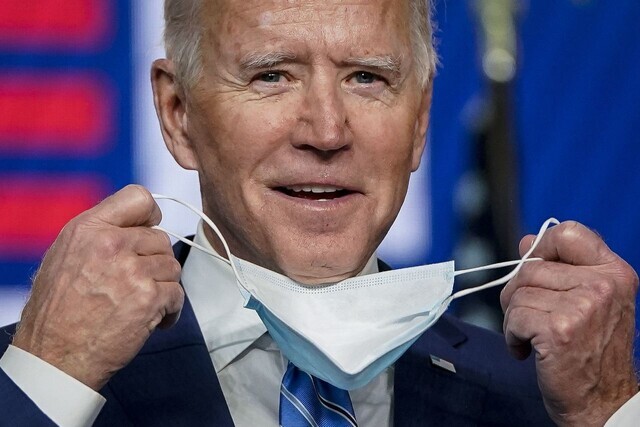hankyoreh
Links to other country sites 다른 나라 사이트 링크
[Editorial] Biden faces the massive task of repairing internal strife and mending relations with allies

Democratic Party candidate Joe Biden is closing in on a victory in what has become a historical US presidential election. With come-from-behind wins in major swing states such as Michigan and Wisconsin, Biden is a short distance away from the necessary 270 votes in the electoral college. Incumbent President Donald Trump has been responding with a barrage of lawsuits, but the prevailing view is that Biden’s official election is a matter of time. On Nov. 4, Biden’s camp set up a website for his transitional committee.
Even if we pass from the time of Trump into the time of Biden, the US still has its work cut out for it. The stark divisions in the US were on full view during the election.
Many members of Trump’s base, which is built on a mix of racism and nationalism, are poorly educated whites who feel they have been marginalized by untrammeled globalization. The US today is a warning about how society can collapse when the establishment and the elites disregard the problems faced by the vulnerable. Restoring unity to American society is only one of many challenges awaiting Biden, who must also address economic issues and deal with COVID-19.
In terms of foreign policy, a pressing question is whether Biden, who has promised to turn away from Trump’s “America first” vision and work with American allies, will be able to restore US leadership in the international community.
Global confidence in the US has plummeted during the four years of Trump’s presidency, and the American public is still leaning toward isolationism.
Biden sent a very positive signal when he wrote on Twitter on the evening of Nov. 4 that the US will rejoin the Paris Climate Agreement “in exactly 77 days.” Biden was referring to Jan. 20, when the next president will be inaugurated.
Regarding the US-China conflict, Biden will probably continue to curb China, but he’s expected to recruit allies to join a multilateral front against China rather than the radical measures adopted by Trump.
For South Korea, this presents a mixture of risks and opportunities. Given the value that Biden places in American allies, he’s likely to show more respect for South Korea’s position than Trump did on issues such as the defense cost-sharing talks and the transfer of wartime operational control (OPCON) over the South Korean military. At the same time, the US is likely to push harder for South Korea to join an anti-China alliance.
Biden supports diplomacy with North Korea but is opposed to Trump’s “top down” method of attempting to hammer out a solution through talks between the two leaders. The South Korean government needs to quickly arrange meetings with Biden’s foreign policy and national security team in order to clearly convey its position and create room for cooperation.
South Korea also needs to draw up a definite blueprint for Seoul to orchestrate a virtuous cycle between the Korean Peninsula peace process and North Korea-US negotiations.
Please direct comments or questions to [english@hani.co.kr]

Editorial・opinion
![[Column] Season 2 of special prosecutor probe may be coming to Korea soon [Column] Season 2 of special prosecutor probe may be coming to Korea soon](https://flexible.img.hani.co.kr/flexible/normal/500/300/imgdb/original/2024/0426/3317141030699447.jpg) [Column] Season 2 of special prosecutor probe may be coming to Korea soon
[Column] Season 2 of special prosecutor probe may be coming to Korea soon![[Column] Park Geun-hye déjà vu in Yoon Suk-yeol [Column] Park Geun-hye déjà vu in Yoon Suk-yeol](https://flexible.img.hani.co.kr/flexible/normal/500/300/imgdb/original/2024/0424/651713945113788.jpg) [Column] Park Geun-hye déjà vu in Yoon Suk-yeol
[Column] Park Geun-hye déjà vu in Yoon Suk-yeol- [Editorial] New weight of N. Korea’s nuclear threats makes dialogue all the more urgent
- [Guest essay] The real reason Korea’s new right wants to dub Rhee a founding father
- [Column] ‘Choson’: Is it time we start referring to N. Korea in its own terms?
- [Editorial] Japan’s rewriting of history with Korea has gone too far
- [Column] The president’s questionable capacity for dialogue
- [Column] Are chaebol firms just pizza pies for families to divvy up as they please?
- [Column] Has Korea, too, crossed the Rubicon on China?
- [Correspondent’s column] In Japan’s alliance with US, echoes of its past alliances with UK
Most viewed articles
- 1AI is catching up with humans at a ‘shocking’ rate
- 2[Column] Season 2 of special prosecutor probe may be coming to Korea soon
- 3Is Japan about to snatch control of Line messenger from Korea’s Naver?
- 4‘We must say no’: Seoul defense chief on Korean, USFK involvement in hypothetical Taiwan crisis
- 5Up-and-coming Indonesian group StarBe spills what it learned during K-pop training in Seoul
- 6The dream K-drama boyfriend stealing hearts and screens in Japan
- 7[Column] ‘Choson’: Is it time we start referring to N. Korea in its own terms?
- 8Amnesty notes ‘erosion’ of freedom of expression in Korea in annual human rights report
- 9Is N. Korea threatening to test nukes in response to possible new US-led sanctions body?
- 10Division commander ordered troops to enter raging flood waters before Marine died, survivor says